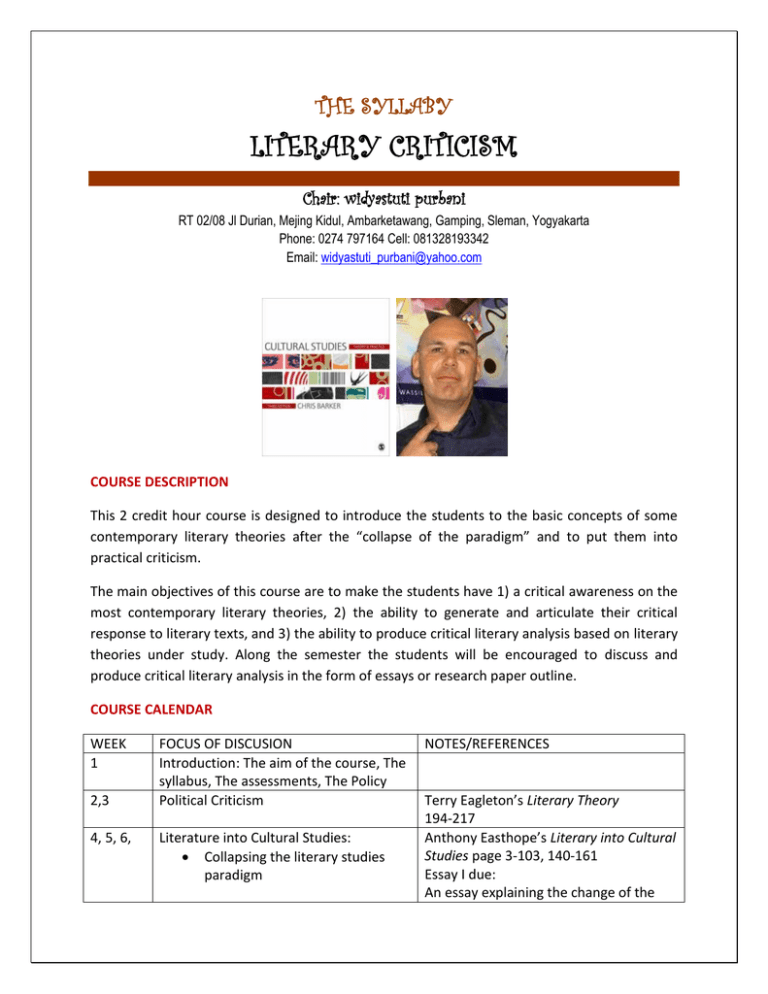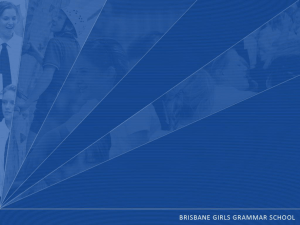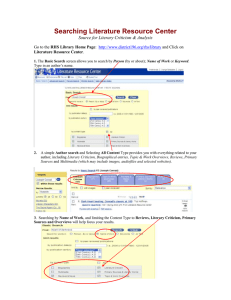LITERARY CRITICISM THE SYLLABY Chair: widyastuti purbani
advertisement

THE SYLLABY LITERARY CRITICISM Chair: widyastuti purbani RT 02/08 Jl Durian, Mejing Kidul, Ambarketawang, Gamping, Sleman, Yogyakarta Phone: 0274 797164 Cell: 081328193342 Email: widyastuti_purbani@yahoo.com COURSE DESCRIPTION This 2 credit hour course is designed to introduce the students to the basic concepts of some contemporary literary theories after the “collapse of the paradigm” and to put them into practical criticism. The main objectives of this course are to make the students have 1) a critical awareness on the most contemporary literary theories, 2) the ability to generate and articulate their critical response to literary texts, and 3) the ability to produce critical literary analysis based on literary theories under study. Along the semester the students will be encouraged to discuss and produce critical literary analysis in the form of essays or research paper outline. COURSE CALENDAR WEEK 1 2,3 4, 5, 6, FOCUS OF DISCUSION Introduction: The aim of the course, The syllabus, The assessments, The Policy Political Criticism Literature into Cultural Studies: Collapsing the literary studies paradigm NOTES/REFERENCES Terry Eagleton’s Literary Theory 194-217 Anthony Easthope’s Literary into Cultural Studies page 3-103, 140-161 Essay I due: An essay explaining the change of the 7, 8, 9, literary paradigm. What happen in the past, now and n the future related to Literary Studies. High Culture/Pop Culture Towards a new paradigm 12, 13 Cultural Studies: Introduction to Cultural Studies Cultural and Communication Studies, Television Studies The Future of Environmental Criticism Chris Barker’s Cultural Studies: Theory and Practice page 1-34 John Fiske’s Cultural and Communication Studies Lawrence Buell’s The Future of Environmental Criticism page 1-61 14, 15 Putting theories into practice 16 Oral presentation and wrap up Samples of literary criticism based on theories under study (selection of critical essays) Essay 2 due: A literary criticism based on the theories of cultural studies, communication studies or environmental criticism. 10, 11, Each student presents his/her extract paper: an application of one of the theories in a literary text ASSESSMENT: 1. 2. 3. 4. 5. Participation and involvement: Essay I Essay II Presentation Examination 15 % 20 % 20 % 20% 25 % COURSE POLICY Plagiarism Policy: Academic dishonesty (plagiarism) is punishable by university and academic rules around the world. In simple terms you commit plagiarism if you fail to cite the sources of all the words and ideas you take from others, thus presenting them as if they were your own. If you commit plagiarism you will automatically fail from the course. For lack of attention a thousand forms of loveliness elude us every day. —Evelyn Underhill




